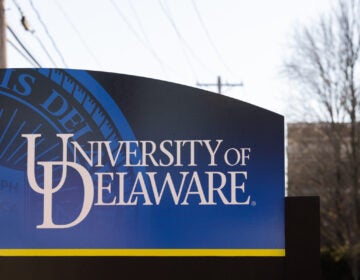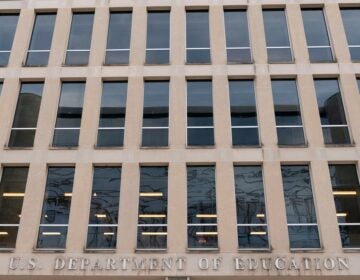‘I can sell’ non-referendum tax increase, Carney tells school leaders [video]
Listen 0:56Calling a feared backlash by voters an “inconvenient consequence,” Gov. John Carney urged a small contingent of upstate school officials Friday to levy a so-called “match tax” so districts can recoup up to $22 million of his $37 million in proposed cuts to education.
Such a tax would cost the New Castle County property owner about $38, Carney told about 30 school board members and administrators at the Christiana Hilton near Stanton.
“I could sell that number,” Carney said while outlining his “shared sacrifice” budget proposal as he has done at some 20 town halls with residents. “I understand that [with] any kind of tax people will say we don’t like it but there’s no way to do it other than to abandon it.”
Others disagree, including a group of teachers, school and community leaders who protested Carney’s cuts Tuesday at Legislative Hall. Their solution: increase income taxes even more than lawmakers are already considering.
Hundreds of teachers statewide have received pending layoff notices, and districts have said they would eliminate or reduce academic and extracurricular programs.
Lawmakers must pass a balanced budget by June 30 – just seven days away.
The group Carney addressed Friday was the New Castle County Combined School Boards, which represents six districts — Brandywine, Christina, Red Clay, Colonial, Appoquinimink and New Castle County Vo-Tech.
With so many in the education community critical of proposed cuts– and Carney’s suggestion that districts claw back some of the money by raising taxes without going to referendum– the breakfast meeting carried the prospect of a tension and conflict.
Instead, Friday’s group gave Carney virtually no pushback during the hourlong session that resembled other “budget reset” presentations Carney has had with the public. While there were a few polite questions, some board members agreed they supported imposing the match tax. John Marinucci, executive director of the Delaware School Boards Association, even thanked Carney for how he has approached the budget situation.
Friday’s session also had many no-shows, most notably Vo-Tech board members. That board already has the power to levy its own tax increases without asking residents in a voter referendum. On hand were about 20 board members from the other districts, at three superintendents and some district public information officers.
The only note of discord was sounded by Kenny Rivera, a teacher in the Brandywine district who is on the Red Clay board. Rivera told Carney he and other colleagues are concerned how residents will react to a future referendum if boards raise taxes this year without voter approval.
“The issue with the match tax being so public is it’s going to put many on the boards in a tough position to vote for it because it’s going to put them in jeopardy when they go to referendum,” Rivera said.
Taking school tax increases from voters
Beyond the match tax proposal, lawmakers have already suggested another method of raising money for schools that would take the longstanding power to increase property taxes out of the hands of residents and give the decision to school boards.
Delaware law requires increases in property tax hikes for school costs – which accounts for roughly two-thirds of an owner’s bill – to be approved in a referendum open to all property owners and residents of the state’s 19 districts.
The second proposal would let school boards raise taxes every two years but the increase would be tied to the Consumer Price Index for Urban Wage Earners and Clerical Workers. That rate was 2.1 percent last year alone.
The problem is that residents are often reluctant to approve increasing their own taxes, even for education. The result is that referendums, like the one recently passed this month by Colonial School District voters, sometimes fail the first time and then pass after districts threaten sweeping layoff and program cuts.
So board members, administrators and other education advocates say they fear repercussions when districts want to seek more dollars in a referendum to pay salaries and other ongoing expenses, or to undertake major construction projects such as renovating an auditorium.
Carney has said in interviews and Friday that that school board members have told him over the years they would like to have the power to raise taxes themselves instead of constantly going to the public, so he’s surprised that many are unwilling to shoulder the responsibility when given the opportunity.
‘Dangerous vote for school boards’
Beyond his questions to Carney Friday morning, Rivera spoke about the issue in an interview to be broadcast Friday night on WHYY’s weekly newsmagazine “First.”
Rivera teaches social studies at Brandywine High and completes his five-year Red Clay term June 30. He told WHYY that currently “voters have a say and they feel like it provides accountability on school districts on the fiscal management. By taking that way from the voters, many voters are scared that districts are going to overspend and raise their taxes too high.”
While Rivera decried Delaware’s “broken funding system’ for schools and echoed a growing chorus of leaders saying it’s well past time to reassess properties statewide to help fund schools, he said each school board will decide in July whether to assess the match if lawmakers enact Carney’s cuts.
“The intentions are good. The state is giving local boards the opportunity to keep very much needed positions to educate our children. On the flip side, without major referendum reform it is always a dangerous vote to for school boards to make because the public could hold the district accountable in future referendums.”
Rivera said that when districts do need to go voters for a significant tax increase, which occurs every three to five years, levying the match tax now “could risk losing that one.”
Increasing taxes based on the consumer price index makes sense to Rivera because it “puts severe limits” on how much school boards can raise.”
That proposal, however, has been mothballed until at least January. Right now lawmakers are trying to figure out a way to get a balanced budget passed.
Any other possible longer-term solutions, such as statewide property tax dedicated solely for education, reassessing properties statewide for the first time in more than 30 years to generate more revenue, or reducing the number of districts in tiny Delaware to consolidate some costs, will not be addressed in this legislative session.
WHYY is your source for fact-based, in-depth journalism and information. As a nonprofit organization, we rely on financial support from readers like you. Please give today.





